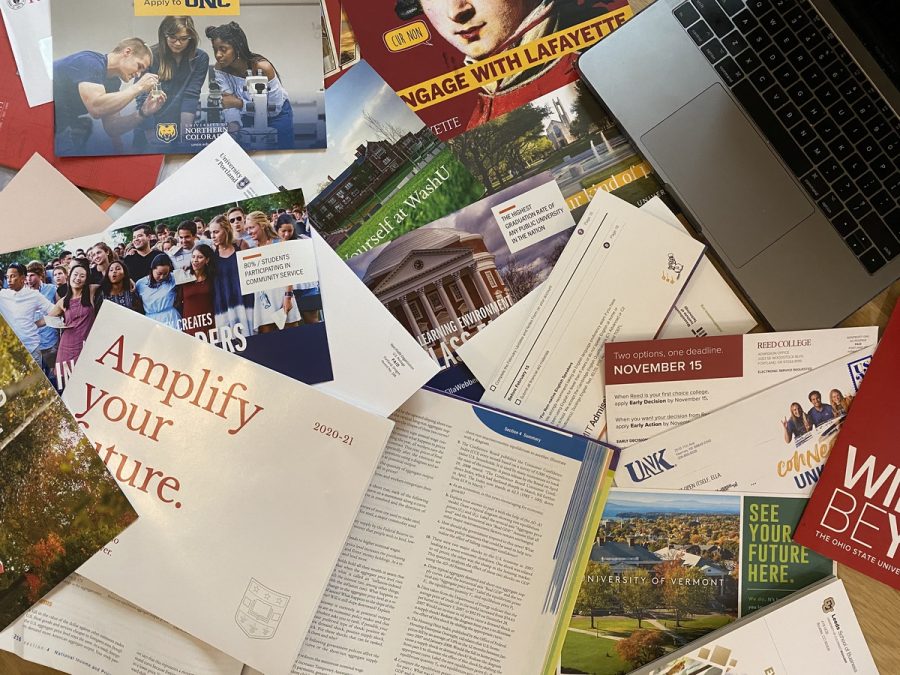Are Ivy League Schools Really the Key to Success?
Many students have their sights set on Ivy League schools, but are they really worth it?
It’s college application season and seniors are hard at work trying to perfect their resume and get into the best possible school. Prestigious institutions may be out of reach to most students, but are these schools really all they’re hyped up to be?
Ivy League schools such as Yale and Brown boast their diverse populations which are made up of around 50 percent of students identifying as racial minorities. But despite being racially diverse schools, they cannot say the same for economic diversity. The majority of students that attend highly selective universities come from wealthy socioeconomic backgrounds. However, wealthy students get the least economic benefit after graduating from these schools when compared to students of low-income backgrounds. Schools like Stanford have tried to combat this by allowing students whose families make less than $65,000 a year to attend for free. Although this is a step in the right direction, tuition isn’t the only factor that prevents low-income students from enrolling in prestigious universities. The application process itself significantly favors those who have more money.
Richer students get better SAT scores on average than those of lower socioeconomic strata for a multitude of reasons, including having more time and money to allocate to test prep and typically a better primary and secondary education. Students that play sports, especially at a highly competitive level, are also more likely to gain admission into universities. A study at Harvard University found that athletes that were admitted to the school had lower academic scores than their non-athlete counterparts. But these aren’t simply athletes who have the greatest natural abilities, they’re those who can afford to be the best. Traveling teams, private coaches and hours of practice time are factors that allow students with higher socioeconomic status to succeed beyond those with fewer resources at their disposal—and often is what allows them entry into selective schools. But many students don’t even have the opportunity to participate in athletics. Students coming from a household that makes less than $75,000 a year are “dramatically less likely to play sports.” Athletes who have commitments such as childcare or a job don’t have the same opportunity to devote their lives to their sport.
In an article by Malcolm Gladwell, he concludes that if a student is bright enough to be accepted into a highly selective institution, they are bright enough to succeed on their own. At first, I read this as a form of bootstrapping, which is an idea that if one works hard enough and is lucky they can improve their socioeconomic position. Unfortunately, we know bootstrapping is not a reliable way to progress your economic standing due to systemic roadblocks in the way for many Americans. However, Gladwell is talking more about how if a student has the intellect and wealth behind them to be admitted into an Ivy League, they don’t really need to attend the Ivy League to be successful. Many wealthy students already have the money, education and connections needed to begin a career without needing to attend such a prestigious college. Unfortunately, most wealthy do not see it that way. College might be a family tradition or status symbol that’s expected of children, even though it isn’t necessary, or even that beneficial, in the long run for students coming from wealthy families.
The demand for college degrees, especially a degree from a well-endowed school, has grown exponentially in our history. Usually, when the demand for a product or service increases, businesses will provide more. But the class sizes at highly competitive schools have not increased to match the demand, so how much are the schools really benefiting our society? Highly selective institutions have the ability to skyrocket low-income students to success. Yet while they have made some improvements, they still have a long way to come. By paving the way for students to gain admission to these schools, and by diversifying their socioeconomic demographics, maybe there can be more college degrees in the hands of low-income Americans. A college degree can provide a boost into well paying, entry-level jobs that wealthier students don’t need as much help getting. This can raise many Americans out of poverty and create a better society for us all.

Ella Webber is a senior at Boulder High and a new member of The Owl. She’s excited to be a part of the paper and hopes to have the opportunity to share the stories of students who aren’t always heard. She hopes to learn as much as possible about the world of journalism and to improve and expand her writing style. Ella is a rower and has been on the crew team for five years and when she’s not out on the water she spends her time exploring the outdoors and all the natural wonders Colorado has to offer. She enjoys fishing and rock climbing with her friends and can be heard blasting ABBA at all hours of the day. One of Ella’s heroes is the “The Queen of Disco” Donna Summer who overcame...


